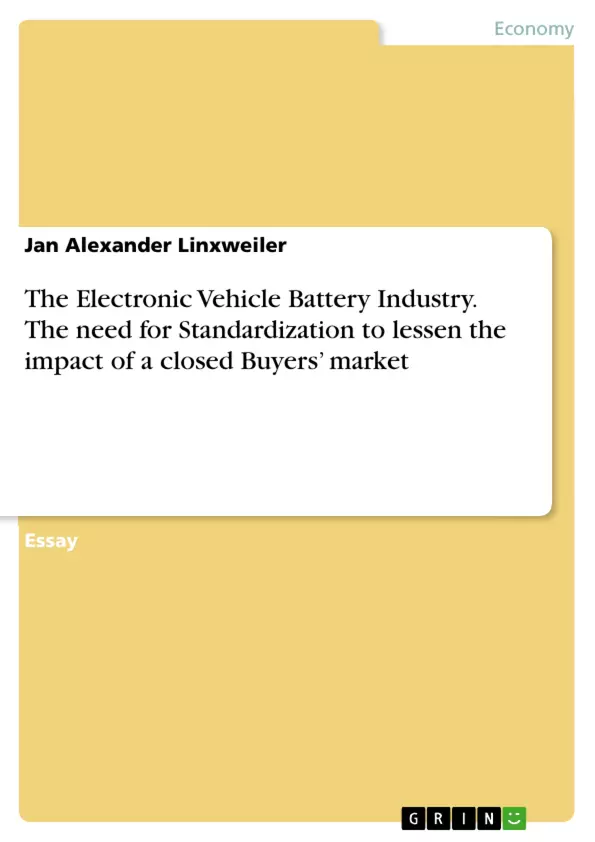The electric vehicle battery is directly codependent to the electric vehicle industry. Both industries suffer from the high switching cost for batteries. Economies of scale and high capital investments have established a competitive and rather closed market. Within this market the buyers’ power is omnipresent. The automobile makers are following a backward vertical integration strategy to increase the benefit within the supply and development chain. At the same time traditional combustion engines still threaten electrification due to customer distrust and again the high switching costs.
Inhaltsverzeichnis (Table of Contents)
- Summary of Analysis
- Sociological Variables
- Technological Variables
- Environmental Variables
- Economic Variables
- Political Variables
- Barriers to Entry
- Bargaining Power of Buyers
- Bargaining Power of Suppliers
- Industry Competitors
- Threat of Substitute Products
- Conclusion
- Forecast and/or Implications
- Works Cited
Zielsetzung und Themenschwerpunkte (Objectives and Key Themes)
This analysis examines the electric vehicle battery industry, highlighting its codependency with the broader electric vehicle market. The primary objective is to understand the competitive dynamics within this industry, particularly the impact of a closed buyers' market and the need for standardization. The analysis utilizes Porter's Five Forces framework to assess the industry's competitive landscape.
- The impact of high switching costs for batteries
- The influence of economies of scale and high capital investments
- The power dynamics between buyers and suppliers
- The role of government subsidies and regulations
- The threat posed by traditional combustion engines and hybrid models
Zusammenfassung der Kapitel (Chapter Summaries)
- Summary of Analysis: This section provides a brief overview of the key factors influencing the electric vehicle battery industry, including sociological, technological, environmental, economic, and political variables.
- Sociological Variables: This chapter explores the growing public awareness of climate change and the increasing acceptance of new technologies, which drive consumer demand for electric vehicles and their associated batteries.
- Technological Variables: This section examines the rapid technological advancements in battery technology and their impact on the industry, including the development of new business models and more efficient resource utilization.
- Environmental Variables: This chapter highlights the growing demand for environmentally friendly solutions and the role of electric vehicle batteries in reducing carbon emissions.
- Economic Variables: This section discusses the economic benefits of government subsidies and the emerging business models associated with electric vehicle solutions. It also addresses the challenges posed by the current infrastructure and the need for further development.
- Political Variables: This chapter explores the active support provided by governments for the development and sale of electric vehicles, including subsidies and regulatory frameworks.
- Barriers to Entry: This section analyzes the high capital investment and economies of scale requirements that act as significant barriers to entry for new competitors in the electric vehicle battery industry.
- Bargaining Power of Buyers: This chapter examines the dominant position of buyers in the market, their interest in cooperation, and their adoption of backward vertical integration strategies.
- Bargaining Power of Suppliers: This section explores the limited impact of suppliers due to market pressures.
- Industry Competitors: This chapter discusses the competitive landscape within the industry, including pricing and switching costs, innovative alternatives to fossil fuels, and the influence of traditional automotive companies.
- Threat of Substitute Products: This section analyzes the pressure exerted by traditional automobiles, the distrust of new technologies, and the development of hybrid models as substitutes for electric vehicles.
Schlüsselwörter (Keywords)
The electric vehicle battery industry is characterized by several key concepts, including: electric vehicles, battery technology, switching costs, economies of scale, high capital investment, government subsidies, environmental impact, climate change, public awareness, technological advancements, and competitive dynamics.
Frequently Asked Questions
What is the main challenge for the electric vehicle battery industry?
The industry suffers from high switching costs, high capital investment requirements, and a closed market dominated by the bargaining power of buyers.
How do automobile makers influence the battery supply chain?
Many use a backward vertical integration strategy to gain more control and benefit within the development and supply chain of batteries.
What role does government policy play in this industry?
Governments provide active support through subsidies and regulatory frameworks to encourage the development and sale of electric vehicles.
What are the barriers to entry for new competitors?
Significant barriers include the need for economies of scale and the very high capital investments required to compete with established players.
What are the threats to the electrification of vehicles?
Traditional combustion engines and hybrid models still pose a threat due to consumer distrust, high switching costs, and existing infrastructure.
- Quote paper
- Jan Alexander Linxweiler (Author), 2016, The Electronic Vehicle Battery Industry. The need for Standardization to lessen the impact of a closed Buyers’ market, Munich, GRIN Verlag, https://www.grin.com/document/341760



